Collapsology books
Booklist
Editors: this should be a growing list
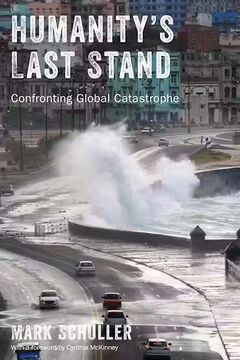
Humanity's Last Stand
Schuller
Are we as a species headed towards extinction? As our economic system renders our planet increasingly inhospitable to human life, powerful individuals fight over limited resources, and racist reaction to migration strains the social fabric of many countries. How can we retain our humanity in the midst of these life-and-death struggles?
Humanity’s Last Stand dares to ask these big questions, exploring the interconnections between climate change, global capitalism, xenophobia, and white supremacy. As it unearths how capitalism was born from plantation slavery and the slaughter of Indigenous people, it also invites us to imagine life after capitalism. The book teaches its readers how to cultivate an anthropological imagination, a mindset that remains attentive to local differences even as it identifies global patterns of inequality and racism.
Surveying the struggles of disenfranchised peoples around the globe from frontline communities affected by climate change, to #BlackLivesMatter activists, to Indigenous water protectors, to migrant communities facing increasing hostility, anthropologist Mark Schuller argues that we must develop radical empathy in order to move beyond simply identifying as “allies” and start acting as “accomplices.” Bringing together the insights of anthropologists and activists from many cultures, this timely study shows us how to stand together and work toward a more inclusive vision of humanity before it’s too late.
https://www.rutgersuniversitypress.org/humanitys-last-stand/9781978820876/
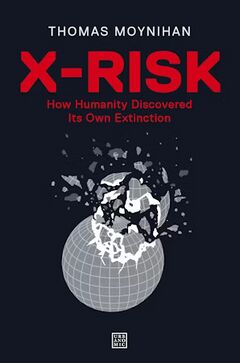
X-Risk
Moynihan
From forecasts of disastrous climate change to prophecies of evil AI superintelligences and the impending perils of genome editing, our species is increasingly concerned with the prospects of its own extinction. With humanity's future on this planet seeming more insecure by the day, in the twenty-first century, existential risk has become the object of a growing field of serious scientific inquiry. But, as Thomas Moynihan shows in X-Risk, this preoccupation is not exclusive to the post-atomic age of global warming and synthetic biology. Our growing concern with human extinction itself has a history.
Tracing this untold story, Moynihan revisits the pioneers who first contemplated the possibility of human extinction and stages the historical drama of this momentous discovery. He shows how, far from being a secular reprise of religious prophecies of apocalypse, existential risk is a thoroughly modern idea, made possible by the burgeoning sciences and philosophical tumult of the Enlightenment era. In recollecting how we first came to care for our extinction, Moynihan reveals how today's attempts to measure and mitigate existential threats are the continuation of a project initiated over two centuries ago, which concerns the very vocation of the human as a rational, responsible, and future-oriented being.
https://mitpress.mit.edu/9781913029845/
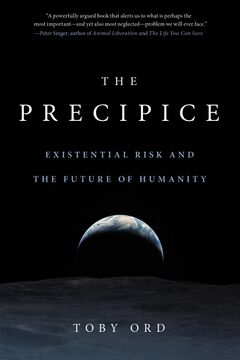
The Precipice
Ord
If all goes well, human history is just beginning. Our species could survive for billions of years – enough time to end disease, poverty, and injustice, and to flourish in ways unimaginable today. But this vast future is at risk. With the advent of nuclear weapons, humanity entered a new age, where we face existential catastrophes – those from which we could never come back. Since then, these dangers have only multiplied, from climate change to engineered pathogens and artificial intelligence. If we do not act fast to reach a place of safety, it will soon be too late.
Drawing on over a decade of research, The Precipice explores the cutting-edge science behind the risks we face. It puts them in the context of the greater story of humanity: showing how ending these risks is among the most pressing moral issues of our time. And it points the way forward, to the actions and strategies that can safeguard humanity.
An Oxford philosopher committed to putting ideas into action, Toby Ord has advised the US National Intelligence Council, the UK Prime Minister's Office, and the World Bank on the biggest questions facing humanity. In The Precipice, he offers a startling reassessment of human history, the future we are failing to protect, and the steps we must take to ensure that our generation is not the last.
https://www.hachettebookgroup.com/titles/toby-ord/the-precipice/9780316484893/?lens=hachette-books
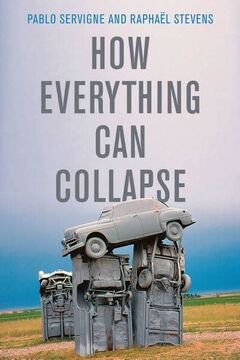
How Everything can Collapse
Servigne and Stevens
What if our civilization were to collapse? Not many centuries into the future, but in our own lifetimes? Most people recognize that we face huge challenges today, from climate change and its potentially catastrophic consequences to a plethora of socio-political problems, but we find it hard to face up to the very real possibility that these crises could produce a collapse of our entire civilization. Yet we now have a great deal of evidence to suggest that we are up against growing systemic instabilities that pose a serious threat to the capacity of human populations to maintain themselves in a sustainable environment.
In this important book, Pablo Servigne and Raphaël Stevens confront these issues head-on. They examine the scientific evidence and show how its findings, often presented in a detached and abstract way, are connected to people’s ordinary experiences – joining the dots, as it were, between the Anthropocene and our everyday lives. In so doing they provide a valuable guide that will help everyone make sense of the new and potentially catastrophic situation in which we now find ourselves. Today, utopia has changed sides: it is the utopians who believe that everything can continue as before, while realists put their energy into making a transition and building local resilience. Collapse is the horizon of our generation. But collapse is not the end – it’s the beginning of our future. We will reinvent new ways of living in the world and being attentive to ourselves, to other human beings and to all our fellow creatures.
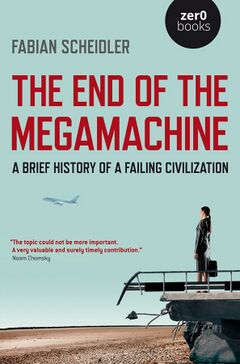
The End of the Megamachine
Scheidler
The End of the Megamachine brings to light the roots of the destructive forces threatening the future of humankind today. While the first part leads us to the very origins of economic, military and ideological power 5000 years ago, the second and key part retraces the formation and expansion of the modern world-system through the last 500 years. Dismantling Western progress mythologies, Scheidler shows how the logics of endless capital accumulation have devastated both human societies and ecosystems from the outset.
With the growing instability and looming collapse of the Megamachine in the 21st century new dangers as well as new possibilities for systemic change open up.
The End of the Megamachine shifts the point of view from a “history of the winners” to a “people’s history”. It highlights the key role of the “metallurgical complex” linking military and financial systems and fostering the evolution of technocratic visions of the world from antiquity to modernity. A particular focus is the history of “apocalyptic thinking” that has been formative for Western culture, both for capitalist projections of a “New World” and for anti-systemic movements.
https://www.megamaschine.org/en/
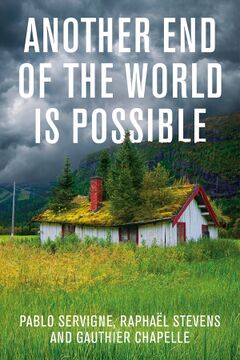
Another End of the World is Possible
Chappele, Servigne and Stevens
The critical situation in which our planet finds itself is no longer in doubt. Some things are already collapsing while others are beginning to do so, increasing the possibility of a global catastrophe that would mean the end of the world as we know it.
As individuals, we are faced with a daily deluge of bad news about the worsening situation, preparing ourselves to live with years of deep uncertainty about the future of the planet and the species that inhabit it, including our own. How can we cope? How can we project ourselves beyond the present, think bigger and find ways not just to survive the collapse but to live it? In this book, the sequel to How Everything Can Collapse, the authors show that a change of course necessarily requires an inner journey and a radical rethinking of our vision of the world. Together these might enable us to remain standing during the coming storm, to develop a new awareness of ourselves and of the world and to imagine new ways of living in it. Perhaps then it will be possible to regenerate life from the ruins, creating new alliances in differing directions – with ourselves and our inner nature, between humans, with other living beings and with the earth on which we dwell.
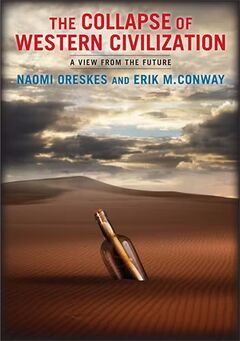
The Collapse of Western Civilisation
Oreskes and Conway
The year is 2393, and the world is almost unrecognizable. Clear warnings of climate catastrophe went ignored for decades, leading to soaring temperatures, rising sea levels, widespread drought and—finally—the disaster now known as the Great Collapse of 2093, when the disintegration of the West Antarctica Ice Sheet led to mass migration and a complete reshuffling of the global order. Writing from the Second People's Republic of China on the 300th anniversary of the Great Collapse, a senior scholar presents a gripping and deeply disturbing account of how the children of the Enlightenment—the political and economic elites of the so-called advanced industrial societies—failed to act, and so brought about the collapse of Western civilization.
In this haunting, provocative work of science-based fiction, Naomi Oreskes and Eric M. Conway imagine a world devastated by climate change. Dramatizing the science in ways traditional nonfiction cannot, the book reasserts the importance of scientists and the work they do and reveals the self-serving interests of the so called "carbon combustion complex" that have turned the practice of science into political fodder. Based on sound scholarship and yet unafraid to speak boldly, this book provides a welcome moment of clarity amid the cacophony of climate change literature.
https://cup.columbia.edu/book/the-collapse-of-western-civilization/9780231169547
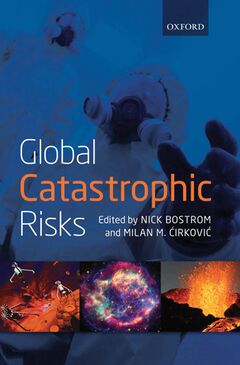
Global Catastrophic Risks
Bostrom and Cirkovic
A global catastrophic risk is one with the potential to wreak death and destruction on a global scale. In human history, wars and plagues have done so on more than one occasion, and misguided ideologies and totalitarian regimes have darkened an entire era or a region. Advances in technology are adding dangers of a new kind. It could happen again.
In Global Catastrophic Risks 25 leading experts look at the gravest risks facing humanity in the 21st century, including asteroid impacts, gamma-ray bursts, Earth-based natural catastrophes, nuclear war, terrorism, global warming, biological weapons, totalitarianism, advanced nanotechnology, general artificial intelligence, and social collapse. The book also addresses over-arching issues - policy responses and methods for predicting and managing catastrophes.
This is invaluable reading for anyone interested in the big issues of our time; for students focusing on science, society, technology, and public policy; and for academics, policy-makers, and professionals working in these acutely important fields.
https://global.oup.com/academic/product/global-catastrophic-risks-9780199606504?cc=us&lang=en&
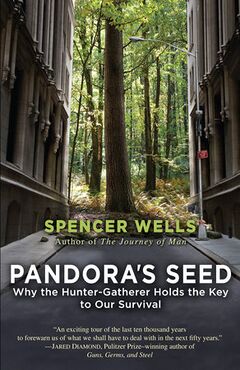
Pandora's Seed
Wells
Ten thousand years ago, our species made a radical shift in its way of life: We became farmers rather than hunter-gatherers. Although this decision propelled us into the modern world, renowned geneticist and anthropologist Spencer Wells demonstrates that such a dramatic change in lifestyle had a downside that we’re only now beginning to recognize. Growing grain crops ultimately made humans more sedentary and unhealthy and made the planet more crowded.
The expanding population and the need to apportion limited resources created hierarchies and inequalities. Freedom of movement was replaced by a pressure to work that is the forebear of the anxiety millions feel today. Spencer Wells offers a hopeful prescription for altering a life to which we were always ill-suited. Pandora’s Seed is an eye-opening book for anyone fascinated by the past and concerned about the future.
https://www.penguinrandomhouse.com/books/188600/pandoras-seed-by-spencer-wells/
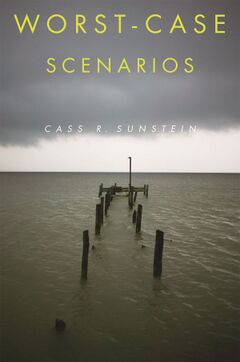
Worst-case Scenarios
Sunstein
Nuclear bombs in suitcases, anthrax bacilli in ventilators, tsunamis and meteors, avian flu, scorchingly hot temperatures: nightmares that were once the plot of Hollywood movies are now frighteningly real possibilities. How can we steer a path between willful inaction and reckless overreaction?
Cass Sunstein explores these and other worst-case scenarios and how we might best prevent them in this vivid, illuminating, and highly original analysis. Singling out the problems of terrorism and climate change, Sunstein explores our susceptibility to two opposite and unhelpful reactions: panic and utter neglect. He shows how private individuals and public officials might best respond to low-probability risks of disaster—emphasizing the need to know what we will lose from precautions as well as from inaction. Finally, he offers an understanding of the uses and limits of cost–benefit analysis, especially when current generations are imposing risks on future generations.
Throughout, Sunstein uses climate change as a defining case, because it dramatically illustrates the underlying principles. But he also discusses terrorism, depletion of the ozone layer, genetic modification of food, hurricanes, and worst-case scenarios faced in our ordinary lives. Sunstein concludes that if we can avoid the twin dangers of overreaction and apathy, we will be able to ameliorate if not avoid future catastrophes, retaining our sanity as well as scarce resources that can be devoted to more constructive ends.
https://www.hup.harvard.edu/books/9780674032514
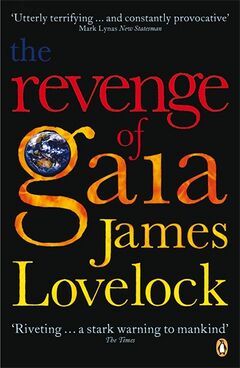
The Revenge of Gaia
Lovelock
James Lovelock's bestselling The Revenge of Gaia: Why the Earth is Fighting Back - and How we can Still Save Humanity is a dire warning against the unchecked growth of civilization.
Despite all our efforts to retreat sustainably, we may be unable to prevent a global decline into a chaotic world ruled by brutal warlords on a devastated Earth...
For thousands of years, humans have exploited the planet without counting the cost. Now Gaia, the living Earth, is fighting back. As the polar icecaps shrink and the global temperature rises, we approach the point of no return. Sustainable development, Lovelock argues, is no longer possible, and the only open to us may be a 'sustainable retreat'. This is the one book you must read to find out what is happening, how bad it will get - and how we can survive.
https://www.penguin.co.uk/books/1155/the-revenge-of-gaia-by-james-lovelock/9780141025971
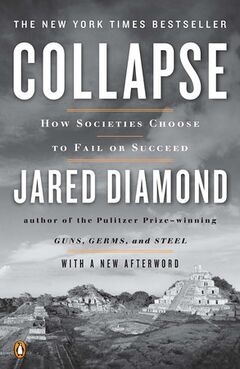
Collapse: How Societies Choose to Fail or Succeed
Diamond
In Jared Diamond’s follow-up to the Pulitzer-Prize winning Guns, Germs and Steel, the author explores how climate change, the population explosion and political discord create the conditions for the collapse of civilization. Diamond is also the author of Upheaval: Turning Points for Nations in Crisis
Environmental damage, climate change, globalization, rapid population growth, and unwise political choices were all factors in the demise of societies around the world, but some found solutions and persisted. As in Guns, Germs, and Steel, Diamond traces the fundamental pattern of catastrophe, and weaves an all-encompassing global thesis through a series of fascinating historical-cultural narratives. Collapse moves from the Polynesian cultures on Easter Island to the flourishing American civilizations of the Anasazi and the Maya and finally to the doomed Viking colony on Greenland. Similar problems face us today and have already brought disaster to Rwanda and Haiti, even as China and Australia are trying to cope in innovative ways. Despite our own society’s apparently inexhaustible wealth and unrivaled political power, ominous warning signs have begun to emerge even in ecologically robust areas like Montana.
Brilliant, illuminating, and immensely absorbing, Collapse is destined to take its place as one of the essential books of our time, raising the urgent question: How can our world best avoid committing ecological suicide?
https://www.penguinrandomhouse.com/books/288954/collapse-by-jared-diamond/
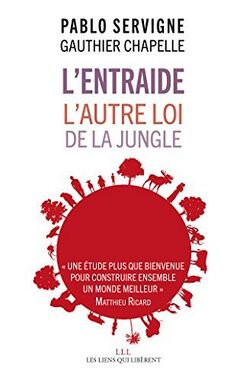
L'entraide: L'autre loi de la jungle
Servigne, Chapelle
Alors que nos sociétés libérales sont fondées sur des valeurs qui ne trouvent trop souvent du sens qu’à travers la compétition, Gauthier Chapelle et Pablo Servigne – l’auteur du succès de librairie Comment tout peut s’effondrer – commettent ici un ouvrage majeur. Au modèle de « la guerre de tous contre tous », ils proposent de substituer une vision du vivre-ensemble basée sur l’entraide. Car en balayant l’éventail du vivant – des bactéries aux sociétés humaines en passant par les plantes et les animaux –, il apparaît clairement que les organismes qui survivent le mieux aux conditions difficiles ne sont pas les plus forts, mais ceux qui s’entraident le plus…
https://www.goodreads.com/book/show/36690231-l-entraide
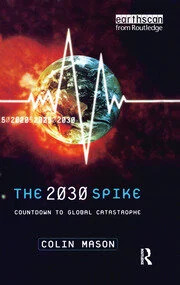
The 2030 Spike
Mason
The clock is relentlessly ticking! Our world teeters on a knife-edge between a peaceful and prosperous future for all, and a dark winter of death and destruction that threatens to smother the light of civilization. Within 30 years, in the 2030 decade, six powerful 'drivers' will converge with unprecedented force in a statistical spike that could tear humanity apart and plunge the world into a new Dark Age. Depleted fuel supplies, massive population growth, poverty, global climate change, famine, growing water shortages and international lawlessness are on a crash course with potentially catastrophic consequences. In the face of both doomsaying and denial over the state of our world, Colin Mason cuts through the rhetoric and reams of conflicting data to muster the evidence to illustrate a broad picture of the world as it is, and our possible futures. Ultimately his message is clear; we must act decisively, collectively and immediately to alter the trajectory of humanity away from catastrophe. Offering over 100 priorities for immediate action, The 2030 Spike serves as a guidebook for humanity through the treacherous minefields and wastelands ahead to a bright, peaceful and prosperous future in which all humans have the opportunity to thrive and build a better civilization. This book is powerful and essential reading for all people concerned with the future of humanity and planet earth.

The Collapse of Complex Societies
Tainter
Any explanation of political collapse carries lessons not just for the study of ancient societies, but for the members of all complex societies in both the present and future. Dr Tainter describes nearly two dozen cases of collapse and reviews more than 2000 years of explanations. He then develops a new and far-reaching theory that accounts for collapse among diverse kinds of societies, evaluating his model and clarifying the processes of disintegration by detailed studies of the Roman, Mayan and Chacoan collapses.
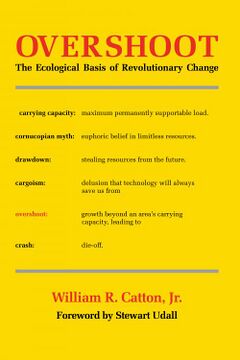
Overshoot: The Ecological Basis of Revolutionary Change
Catton, Jr.
Our day-to-day experiences over the past decade have taught us that there must be limits to our tremendous appetite for energy, natural resources, and consumer goods. Even utility and oil companies now promote conservation in the face of demands for dwindling energy reserves. And for years some biologists have warned us of the direct correlation between scarcity and population growth. These scientists see an appalling future riding the tidal wave of a worldwide growth of population and technology.
A calm but unflinching realist, Catton suggests that we cannot stop this wave - for we have already overshot the Earth's capacity to support so huge a load. He contradicts those scientists, engineers, and technocrats who continue to write optimistically about energy alternatives. Catton asserts that the technological panaceas proposed by those who would harvest from the seas, harness the winds, and farm the deserts are ignoring the fundamental premise that "the principals of ecology apply to all living things." These principles tell us that, within a finite system, economic expansion is not irreversible and population growth cannot continue indefinitely. If we disregard these facts, our sagging American Dream will soon shatter completely.
https://www.press.uillinois.edu/books/?id=p009884
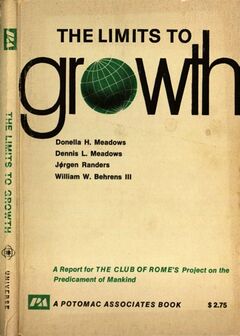
The Limits to Growth
Meadows, Meadows, Randers, Behrens III
Published 1972 – The message of this book still holds today: The earth’s interlocking resources – the global system of nature in which we all live – probably cannot support present rates of economic and population growth much beyond the year 2100, if that long, even with advanced technology. In the summer of 1970, an international team of researchers at the Massachusetts Institute of Technology began a study of the implications of continued worldwide growth. They examined the five basic factors that determine and, in their interactions, ultimately limit growth on this planet-population increase, agricultural production, nonrenewable resource depletion, industrial output, and pollution generation. The MIT team fed data on these five factors into a global computer model and then tested the behavior of the model under several sets of assumptions to determine alternative patterns for mankind’s future. The Limits to Growth is the nontechnical report of their findings. The book contains a message of hope, as well: Man can create a society in which he can live indefinitely on earth if he imposes limits on himself and his production of material goods to achieve a state of global equilibrium with population and production in carefully selected balance.
https://www.clubofrome.org/publication/the-limits-to-growth/
Taken and expanded from https://www.collapsologie.fr/en/books/